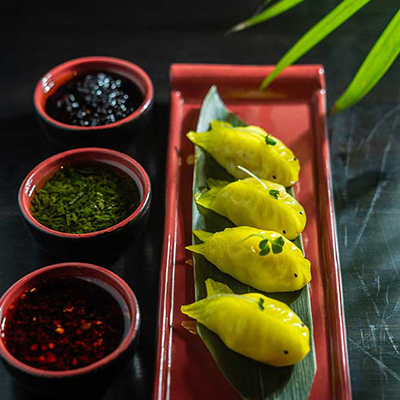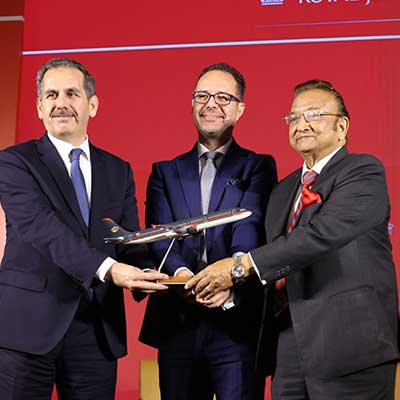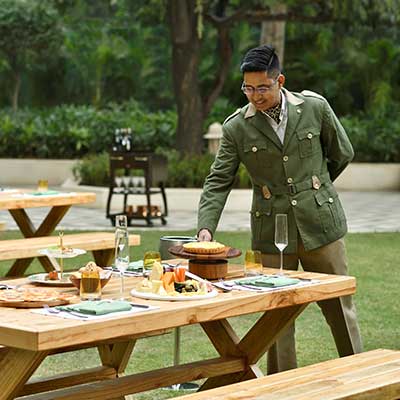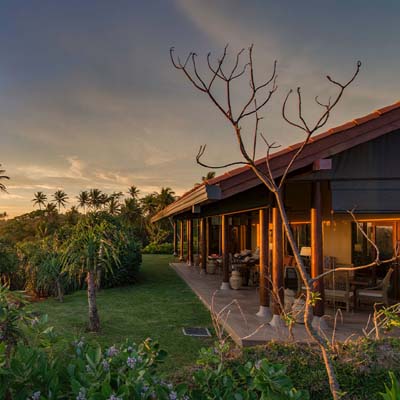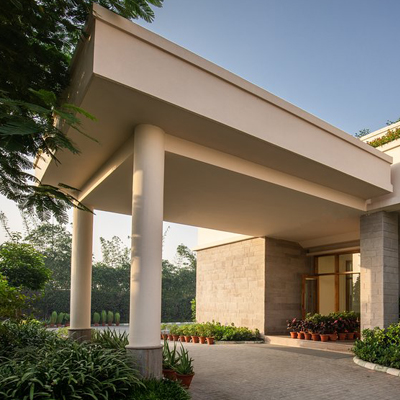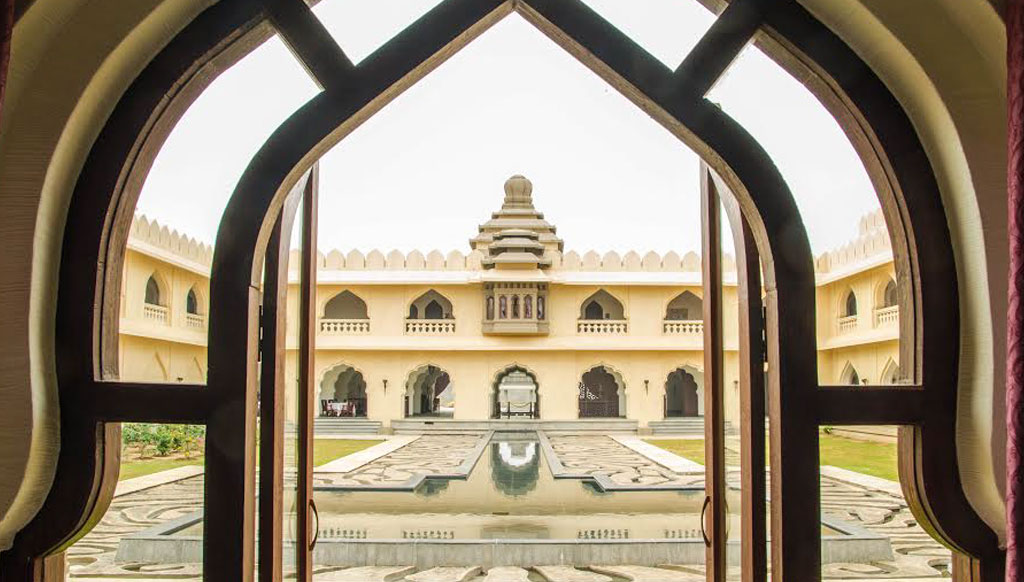
A travelling writer reviews the Orange County Resort Hampi, and finds a slice of history with a dash of luxury inside. Open courtyards where peacocks parade, galleries with curved arches, a mix of earthy elements, chandeliers modelled on the Vijayanagar design and the wall murals—all present a fusion of Indo-Islamic design, beautifully reminiscent of the bygone era
As I entered the massive gates, modeled on the city gates of Hampi, I got the impression that this was the perfect antidote to the urban madness I left behind. A royal welcome with a refreshing coconut based drink and then I was led to my princely room. I was staying in one of the nine private villas, luxuriously spacious with a pool stretched across the length of the room. The villas have been named ‘Jal Mahal’ (palace on water) as they stand like an island on a pool of water, filled with lotus to charm you. Though I hardly spent 10 minutes in the lobby, my gaze had travelled over the expansive artefacts and the detailing in design of the interiors. Breaking away from the traditional reception and lobby styles, the resort had artsy interiors, with the reds, greens, blues and magentas adroitly thrown in over commanding whites, to immerse you in the royal affair. The overall look and feel is of ornate luxury, where elements and arches and corners stand as reminiscence of the royalty of Vijayanagar. It stands as a dazzling epitome of legendary tales with a bold cultural heritage, nestled midst unparalleled natural beauty.
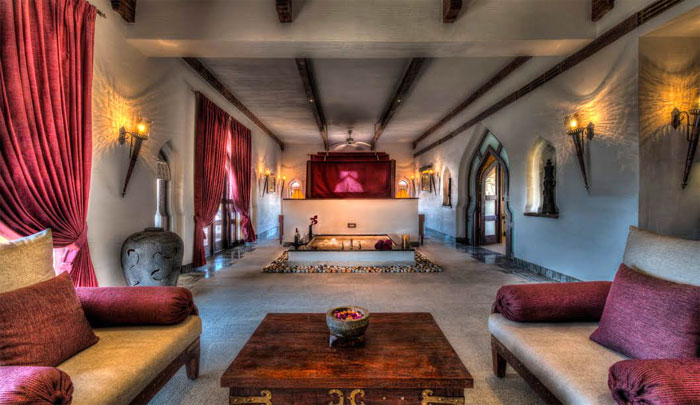
The amalgam of the multiple influences that Vijayanagar kingdom had seen is evident in the interiors of the resort. Open courtyards where peacocks parade, galleries with curved arches that lead from one section to the other, the parapets, a fine mix of earthy elements, the chandeliers modelled on the Vijayanagar design and the wall murals present a good mix of Indo-Islamic fusion in the design, very reminiscent of that bygone era. And then there is a conspicuous over-use of water and the buildings shaped like lotus petals. I was later explained by my host that the entire design has been inspired from the Lotus Mahal in Hampi, and hence water and lotus mix.
The room is full of comfortable corners and spots to spread out in: a mélange of old and new, with dusky wooden beds carved from Mexican ebony, the switches and knobs reminding you of old colonial era, the ornate arches giving a masculine touch to the earthly coloured painted walls, furniture that looks more like taken from some Italian antique shop and a bathroom as big as a living room, with every modern amenity you can list. The lotus motif, which pervades in the ruins of royal enclosures in Hampi, finds its subtle presence everywhere from the façade of the bar to the arches in the living room.
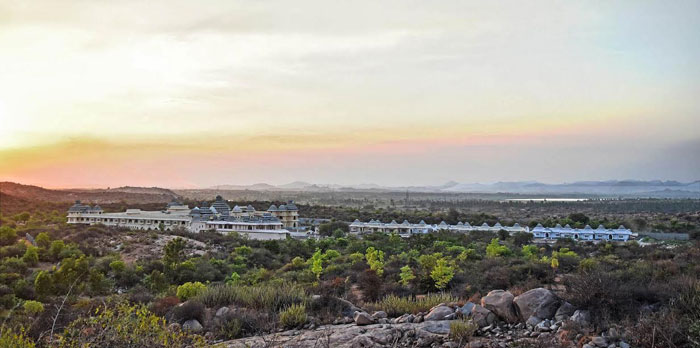
My host Abhishek, the resort manager, was nice enough to show me around. Perhaps this was also a great work up for the sumptuous lunch that was to follow. “You will find one thing very clear in the design of the resort, an attempt to make you feel you are in Vijayanagar Empire,” he said, as he took me from one section to the other. Inside the rooms you can see the alchemy of Indian royalty and the Victorian influence. While the detailing in the room gives you a feel of the bygone era, the design is very contemporary with stylish bathrooms, Jacuzzi, a spacious living space, hard wood furniture and balcony to offer you breath-taking views. We walked to the Lotus Mahal which houses a Mughlai restaurant, a shop to buy artifacts designed by locals, a reading room with a great view and laden with books on Indian culture and Hampi (do spare an evening for reading there, with some insanely awesome brewed coffee and a view to take back with you) and a spa.
Back in the main building and next to the Tuluva restaurant is the infinity pool, insanely huge with a special corner tucked on one side of it—where a romantic candle-night dinner is laid. The entire side of the pool is often doubled up as space for an open sky dinner, spent in gazing at the stars in the clear sky.
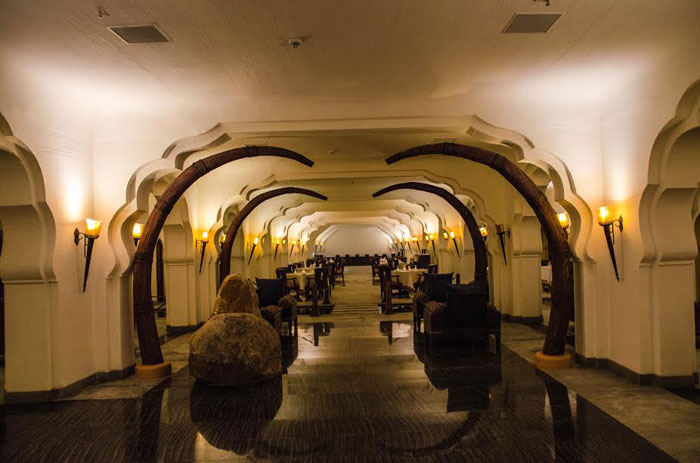
And now it was lunch time. Over these years of travelling, I have developed a notion that lunch tables are the best place to review a hotel. Nothing can make your stay more memorable than good food. And when Abhishek told me that the head chef has been experimenting with local cuisines from Hospet, Raichur and Belgaum, it raised my expectations. Like so many regional cuisines, the real flavours are hard to find unless one is invited to a local home. Having spent months in Karnataka, I am fairly acquainted with the regional flavours. That doesn’t make me a connoisseur but that certainly makes me a little more discerning than others. The aroma of tempered red chillies and curry leaves hit me as the buffet was spread and I gleefully lifted each cloche to discover the culinary sojourn I was led to. It was a feast, to be modest with my words – the earthy flavor of country chicken in a thick gravy (saru), the palle (vegetable of water melon), the unique flavour of sambhar, beans served with authentic local breads bajra and akki (rice flour) roti. And what gives you a far greater personal touch is the pampering you get, right from the time of entering the hotel, keeping the tables, escorting you to your room to delightful conversations at the dinner table. Orange County ensures you leave the resort with a smile on your face.
The Hampi Trails – Hampi is steeped in history and though the lessons start from the resort itself, there is always more to know here.
About Hampi: Hampi was the capital of Vijayanagar Empire and now a UNESCO World Heritage site. The empire reached its zenith under the reign of Krishna Deva Raya and hosted a population second only to Beijing, making it one of the largest and wealthiest kingdoms of India. Eminent historian Robert Swell has compared Hampi to Western cultures in terms of monetary and cultural wealth. The kingdom was completely devastated when Bahamani forces of Bidar, Birar, Raichur, Gulbarga and Golconda attached and vanquished the Vijayanagar forces and laid the city to waste. Not much is documented about the empire in history and it was so sordidly ignored, that it won the sobriquet ‘The forgotten empire’.
Aakash is a freelance travel writer blogging at handofcolors.me





